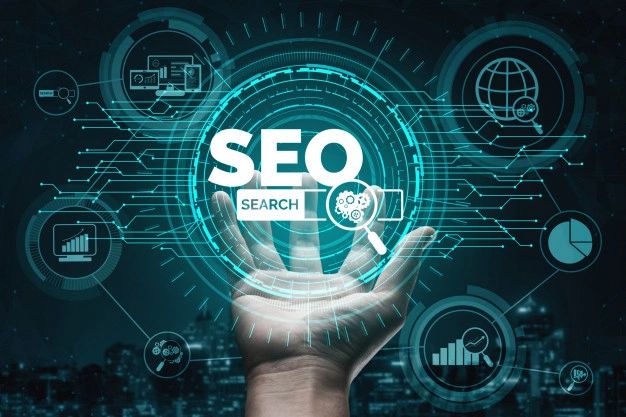Refining Your SEO Approach to Navigate the Evolving Landscape of 2025

Team Animax Global Author All Posts Our Recent Blogs January 26, 2025 Refining Your SEO Approach to Navigate the Evolving Landscape of 2025 Read More Posted By Team Animax Global January 17, 2025 Boosting Real Estate Success: The Power of Digital Marketing Read More Posted By Team Animax Global January 15, 2025 How AI is Revolutionizing Digital Marketing in 2025 Read More Posted By Team Animax Global 1 2 Next Boosting Real Estate Success: The Power of Digital Marketing Team Animax Global January 15, 2025 AI in Digital Marketing, Artificial Intelligence in Marketing, Content Marketing Strategies, Customer Experience and AI, Digital Marketing Trends, Future Marketing Innovations, Marketing Automation, SEO and AI Integration, Technology in Marketing Search Engine Optimization (SEO) continues to be a cornerstone of digital marketing success, but in 2025, the rules of the game are shifting more dynamically than ever. With constant algorithm updates, advances in AI, and changing user behaviors, businesses must rethink their SEO strategies to stay ahead. Here’s how you can refine your approach to meet the challenges of the evolving SEO landscape this year. 1. Embrace AI-Driven Search Artificial Intelligence (AI) is transforming how search engines understand and rank content. With tools like Google’s RankBrain and advancements in natural language processing (NLP), search engines are better equipped to understand user intent. To keep up: Focus on creating content that addresses specific user queries and needs. Use AI tools to analyze trends and identify content opportunities. Optimize for conversational search to align with how users phrase queries in voice and text searches. 2. Prioritize E-A-T Expertise, Authoritativeness, and Trustworthiness (E-A-T) remain crucial for ranking well. In 2025, building credibility is non-negotiable: Publish content backed by data and authored by credible experts. Enhance your site’s trust signals, such as secure HTTPS, updated privacy policies, and testimonials. Build quality backlinks from authoritative sources in your industry. 3. Optimize for Voice Search Voice search continues to grow as users rely on virtual assistants like Siri, Alexa, and Google Assistant. To capture this audience: Use natural, conversational keywords in your content. Optimize for long-tail keywords and question-based queries. Structure your content using FAQ formats and schema markup to improve voice search visibility. 4. Focus on Core Web Vitals Google’s emphasis on user experience through Core Web Vitals (loading, interactivity, and visual stability) will remain a critical ranking factor. Ensure your site: Loads quickly, even on mobile devices. Has minimal layout shifts and provides a seamless user experience. Is responsive and mobile-friendly to cater to users on the go. 5. Capitalize on Visual Search With the rise of platforms like Google Lens, visual search is gaining traction. To leverage this trend: Optimize images with descriptive file names and alt text. Use high-quality, relevant visuals in your content. Implement image sitemap and structured data to improve discoverability. 6. Leverage Local SEO Local SEO is evolving, and businesses targeting local customers must adapt: Keep your Google Business Profile updated with accurate information. Use location-specific keywords in your content. Encourage customers to leave reviews and engage with your profile actively. 7. Create Interactive and Engaging Content Interactive content, such as quizzes, polls, and infographics, is becoming more critical to engage users and reduce bounce rates. Aim to: Provide value-added, shareable content. Integrate multimedia elements like videos and interactive widgets. Align your content with your audience’s preferences and pain points. 8. Monitor Algorithm Updates Search engines are continually updating their algorithms. Stay informed by: Following official announcements from Google and other search engines. Regularly auditing your website to ensure compliance with the latest updates. Using analytics tools to track changes in traffic and ranking patterns. Final Thoughts The SEO landscape in 2025 is a mix of new technologies, user preferences, and search engine innovations. By refining your SEO approach to align with these changes, you can maintain a competitive edge and drive meaningful results for your business. Adaptability is key, and those who stay proactive in understanding and implementing the latest trends will thrive. Start evolving your SEO strategy today to navigate the challenges and opportunities that lie ahead. AI for SEO Optimization AI in Content Marketing AI in Digital Marketing 2025 AI Marketing Automation AI Tools for Marketers AI-Driven Customer Experiences AI-Powered Marketing Strategies Artificial Intelligence Trends 2025 Digital Marketing Trends 2025 Emerging AI Technologies in Marketing Future of Digital Marketing Personalized Marketing with AI Predictive Analytics in Marketing Revolutionizing Digital Marketing with AI Voice Search Optimization with AI Leave a Reply Cancel reply Logged in as Team Animax Global. Edit your profile. Log out? Required fields are marked * Message*
Social Media and AI: How Technology is Transforming Engagement

Team Animax Global Author All Posts Our Recent Blogs January 12, 2025 Social Media and AI: How Technology is Transforming Engagement Read More Posted By Team Animax Global January 12, 2025 AI and Voice Search Optimization: Revolutionizing SEO Read More Posted By Team Animax Global January 11, 2025 The Rise of AI in Digital Marketing: How to Stay Ahead Read More Posted By Team Animax Global 1 2 Next AI and Voice Search Optimization: Revolutionizing SEO Team Animax Global January 11, 2025 AI in Digital Marketing, All, Marketing Social media platforms have evolved from basic networking sites to powerful ecosystems that influence buying behavior, shape opinions, and drive brand growth. Central to this evolution is Artificial Intelligence (AI), which is revolutionizing how businesses and consumers interact online. This blog explores the key advancements in AI for social media and provides actionable strategies to leverage these innovations for enhanced engagement. The Role of AI in Social Media AI powers numerous behind-the-scenes processes that make social media platforms efficient and user-friendly. Here are some ways AI is integrated: Content Recommendations: Algorithms analyze user preferences, engagement patterns, and browsing history to suggest personalized content, keeping users hooked. Example: YouTube’s AI-powered “For You” page offers hyper-personalized videos, leading to increased user retention. Ad Targeting: AI optimizes ad placement by analyzing audience behavior, ensuring that ads reach the right people at the right time. Example: Facebook Ads Manager uses AI to create lookalike audiences, maximizing ad effectiveness. Image and Video Recognition: AI processes visual content for categorization, tagging, and search functionality. Example: Instagram’s AI detects objects in photos to enhance its Explore page and ad targeting. Chatbots and Automated Messaging: AI chatbots streamline customer service by providing instant responses and resolving common queries. Example: Sephora’s chatbot on Messenger helps customers find products and book appointments. Key Advancements in AI for Social Media Predictive Analytics: AI uses historical data to forecast trends, enabling brands to stay ahead of the curve. How to Use: Monitor emerging hashtags and topics with tools like Hootsuite Insights or Sprout Social. Create content aligned with predicted trends to capture early engagement. Sentiment Analysis: AI can gauge public sentiment around a brand or topic by analyzing social media conversations. How to Use: Use tools like Brandwatch or NetBase to understand customer emotions. Respond proactively to negative sentiment and amplify positive feedback. Content Creation and Curation: AI assists in generating and recommending content tailored to audience preferences. Example: Tools like Canva’s AI features and Jasper AI help design visuals and write captions for social media posts. AI-Driven Influencer Marketing: AI identifies the right influencers for campaigns by analyzing engagement metrics, audience demographics, and relevance. How to Use: Platforms like AspireIQ and Upfluence use AI to connect brands with influencers who align with their goals. Real-Time Engagement Analysis: AI evaluates the performance of posts in real-time, suggesting adjustments to improve reach and interaction. How to Use: Use real-time analytics tools to tweak ad targeting, posting schedules, or content format. Benefits of AI in Social Media Marketing Improved Personalization: AI tailors content and ads to individual preferences, resulting in higher engagement rates. Increased Efficiency: Automation tools handle repetitive tasks like scheduling posts, freeing up time for strategy and creativity. Enhanced Customer Insights: AI analyzes vast amounts of data to uncover patterns in customer behavior, helping refine marketing strategies. Better ROI: AI ensures that marketing budgets are spent efficiently by targeting the right audience and optimizing campaigns. How to Leverage AI for Social Media Success Use AI-Powered Scheduling Tools: Platforms like Buffer and Hootsuite optimize post timings for maximum visibility. Example: Schedule posts based on when your audience is most active to boost engagement. Experiment with AI Content Tools: Tools like Lumen5 and Adobe’s Sensei can help create high-quality videos and graphics quickly. Example: Turn blog posts into engaging video snippets for Instagram or LinkedIn. Monitor Performance with Analytics: Use AI-driven insights to measure the success of your campaigns. Example: Track KPIs like reach, impressions, and conversion rates using tools like Socialbakers. Invest in Social Listening: Social listening tools powered by AI allow you to track brand mentions, industry trends, and competitor activity. Example: Identify opportunities to engage with customers or join trending conversations to increase visibility. Integrate Chatbots: Deploy AI chatbots on platforms like Messenger or WhatsApp to handle queries and provide support. Example: Create a chatbot that guides users through product recommendations based on their preferences. Challenges of Using AI in Social Media Data Privacy Concerns: Collecting user data for AI analysis must comply with regulations like GDPR and CCPA. Initial Costs: Investing in AI tools and training can be expensive for small businesses. Over-Automation Risks: Relying too heavily on AI may result in content that lacks a personal touch. Constant Updates: AI technology evolves rapidly, requiring businesses to stay updated to remain competitive. Future Trends in AI and Social Media Augmented Reality (AR) Integration: AI-driven AR filters and experiences will become more common on platforms like Instagram and Snapchat. Voice-Powered Interactions: Voice assistants will enable users to navigate social media through voice commands. AI-Powered Content Moderation: Enhanced AI algorithms will detect harmful content and maintain safe online environments. Hyper-Personalized Ads: AI will refine ad targeting to include real-time behavioral cues and preferences. Conclusion AI is a transformative force in social media, enabling brands to engage with audiences more effectively and efficiently. By leveraging tools for content creation, sentiment analysis, influencer marketing, and real-time performance tracking, businesses can stay ahead in the competitive digital landscape. As technology continues to evolve, adopting AI-driven strategies will be essential to maximize social media’s potential and foster meaningful connections with customers. AI Content Creation AI in Digital Marketing AI Tools for Businesses Artificial Intelligence Trends Benefits of AI in Marketing Challenges of AI Implementation Chatbots and Virtual Assistants Chatbots in Marketing Digital Marketing Innovations Future of Digital Marketing Marketing Automation Marketing Automation Tools Marketing Technology Personalized Marketing Strategies Predictive Analytics Predictive Analytics in Marketing Leave a Reply Cancel reply Logged in as Team Animax Global. Edit your profile. Log out? Required fields are marked *
